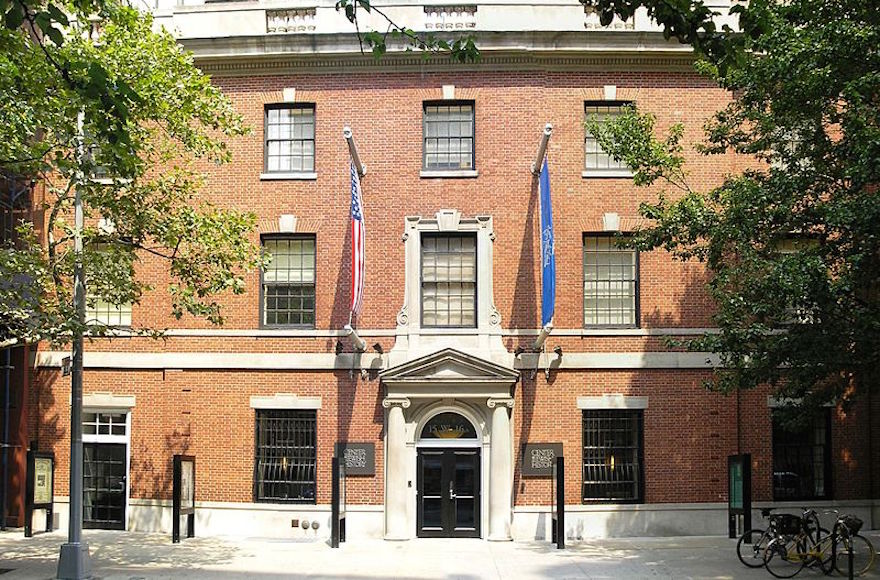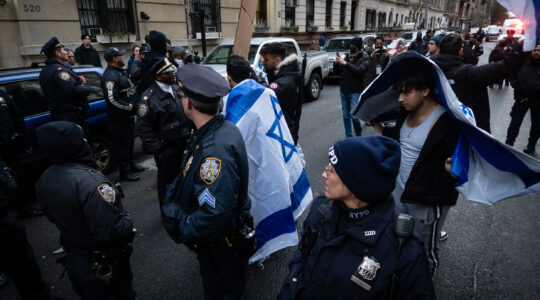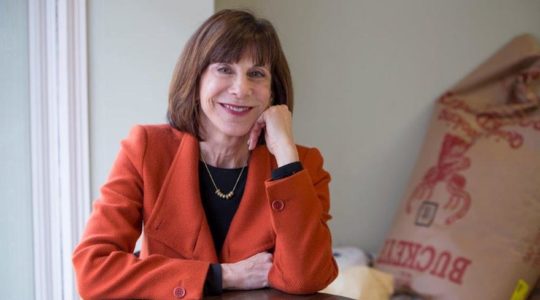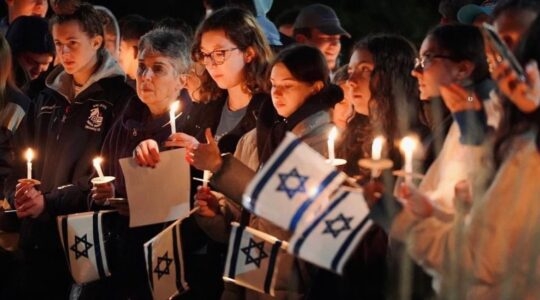(JTA) — The American Jewish Historical Society has canceled two events associated with a Jewish group that supports the BDS movement.
The decision to cancel the events came from a small portion of the board, according to Lila Corwin Berman, chair of the society’s academic council. It followed complaints by right-wing activists who have separately sought to remove David Myers, the newly appointed executive of the Center for Jewish History, AJHS’s partner institution, because of his support for left-wing groups like the New Israel Fund and J Street.
The society announced last week that it was canceling an October panel on the Balfour Declaration and a December reading of a play. The panel, on the United Kingdom’s 1917 declaration of support for a Jewish homeland in Palestine, featured two pro-Palestinian activists and was co-sponsored by Jewish Voice for Peace, which supports the Boycott, Divestment and Sanctions movement against Israel.
The society also canceled the dramatic reading of “Rubble Rubble,” whose author, Dan Fishback, is a member of JVP. The play, according to the event description, is partially about “an American Israeli settler [who] welcomes her anti-Zionist nephew for a visit.” JVP members were offered reduced admission to the reading.
“After further consideration, the American Jewish Historical Society is cancelling the Balfour Program scheduled for October 26th and the dramatic reading of ‘Rubble, Rubble,’ scheduled for December 14th,” the society’s statement read. “While the programs themselves may have merit, they do not align with the mission of the AJHS.”
In the days since his play’s cancellation, Fishback has raised more than $10,000 to put on an independent performance of “Rubble Rubble.” Another artist, Ofri Cnaani, announced last week that she would remove her art installation about early 20th century Jewish anarchist Emma Goldman from the Center for Jewish History to protest the cancellation of Fishback’s play.
“But now we are committed to making this performance bigger and better than it would have been otherwise, and without a big institution’s farkakte $18 ticket fees,” Fishback wrote on his fundraising page, using a Yiddish word that translates roughly to “ridiculous.” “Please join us in supporting free speech and creating space in the cultural landscape for Jews who oppose the occupation.”
Berman, who is also director of Temple University’s Feinstein Center for American Jewish History, said the decision to cancel was made by “a small group of the board.”
“They made the decision they thought made the most sense in terms of the mission of AJHS,” she said. “We are in an awfully troubling political climate right now when it comes to the politics around Israel and American Jews.”
AJHS, a vast archive that documents American Jewry from 1654 to the present, says its public programs are designed to promote “cross-cultural exchanges and multi-disciplinary research interests while expanding the conversations on American Jewish history, cultures, identities, and the arts.”
AJHS’s director of programming, Shirly Bahar, has written on her personal Facebook page that her goal is to foster “critical, edgy, and politically challenging cultural and academic programs where difficult conversations about Mizrahim, Jews of Color, Palestine, cross-cultural solidarity, and anti-racism are highlighted rather than censored.”
Bahar supports a boycott of Israel. Last December, she wrote a “Statement in Support of a Boycott of Israeli Academic Institutions” for members of the Modern Language Association who support a boycott of Israeli academic institutions.
“I support BDS as an Israeli whose Jewish-Israeli citizenship marked on her ID card exempts her from the harsh oppression that Palestinians experience on a daily basis,” Bahar wrote. “I am not interested in the special privileges and safety that my Jewish identity mark grants me on the expense of Palestinian lives and basic human rights.”

A reading of the Dan Fishback play “Rubble Rubble” at the American Jewish Historical Society was canceled by its board. (Ben Gabbe/Getty Images)
Fishback said he had no advance notice that his play would be canceled. The playwright said he supports boycotting cultural works funded by Israel’s government in order to influence its policies, but not boycotting artists due to disagreement with their views.
“This regularly happens at Jewish institutions,” Fishback, a self-described “anti-Zionist Jew,” wrote in an email to JTA. “The people doing the actual work are very open minded. The funders and people who are detached from the real work — they’re the ones who make wrong-headed decisions like this.”
One additional board member confirmed to JTA that the board as a whole was not involved in the decision to cancel the events. Attempts to reach the professional staff and other members of the AJHS board were unsuccessful.
Support for the BDS movement is considered a red line by the largest pro-Israel and Jewish defense organizations, including those who either share views with or tolerate left-wing groups like the New Israel Fund and J Street. The Anti-Defamation League condemned Jewish Voice for Peace in a 2014 report, saying its “positions on BDS, its willingness to partner with anti-Israel organizations that deny Israel’s right to exist, and its refusal to support a two-state solution to the Israeli-Palestinian conflict demonstrate its hardline stance.”
The decision to cancel the events at AJHS followed an op-ed written by Ronn Torossian, a public relations professional with right-wing views on Israel, that documented connections between JVP and the events.
Torossian has been spearheading the campaign to dismiss Myers, a former professor of Jewish history at UCLA. Torossian ended the op-ed by writing that “David N. Myers must not continue as head of the Center for Jewish History.” The five institutions housed under the CJH umbrella — including AJHS, the American Sephardi Federation and the Yeshiva University Museum — operate independently of their host.
Last month, the board of the Center for Jewish History said in a statement that Myers “enjoys the full and unwavering support of the board and staff.”






